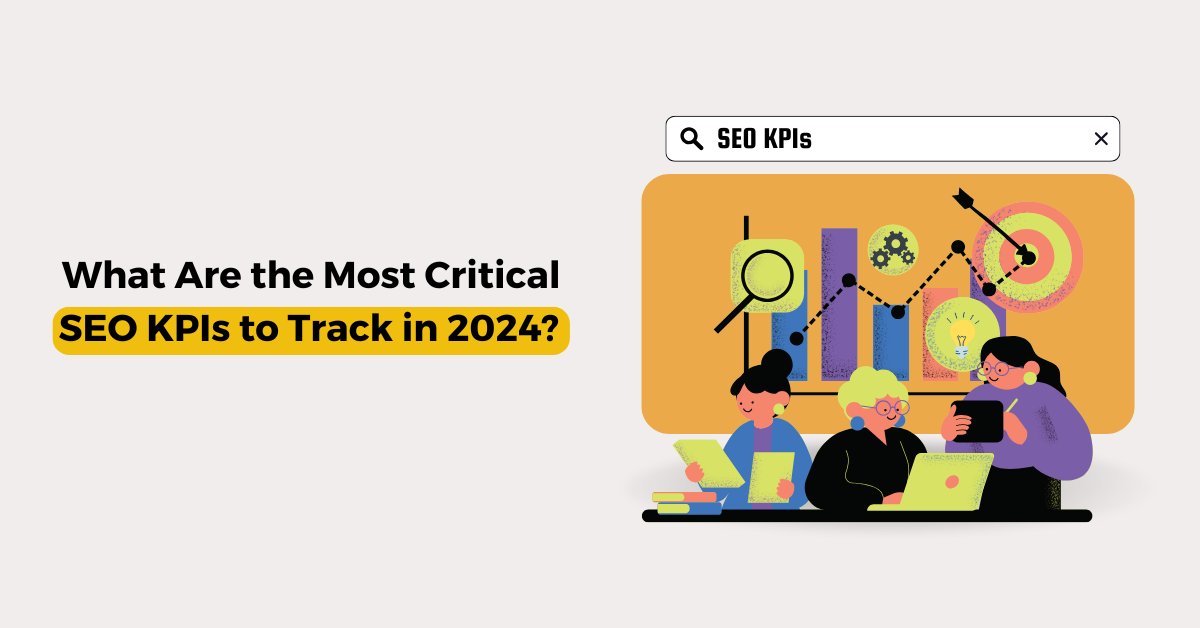What Are the Most Critical SEO KPIs to Track in 2024?
In the dynamic world of digital marketing, staying ahead of the competition in 2024 requires a keen understanding of Search Engine Optimization (SEO) and its nuanced metrics. Key Performance Indicators (KPIs) act as crucial navigational tools, guiding your SEO strategy toward success. Tracking the right KPIs not only enhances your SEO strategies but also ensures you make informed decisions that improve your website’s visibility and business outcomes. As we delve into the most critical SEO KPIs to track in 2024, keep in mind that focusing on these metrics can be a game-changer for your online presence.
What Are SEO KPIs?
SEO Key Performance Indicators (KPIs) are measurable values that demonstrate how effectively your SEO strategies are achieving business objectives. These benchmarks help you understand the performance of your website in organic search and highlight areas that need improvement. By tracking specific metrics, you can gauge the success of your content, the usability of your website, and the effectiveness of your keyword strategies. SEO KPIs are essential as they transform intangible data into actionable insights, allowing you to tweak your approach to reach the desired outcomes efficiently.
Why Tracking SEO KPIs Is Crucial in 2024
As search engines evolve, the importance of tracking SEO KPIs becomes even more pronounced in 2024. With Google’s algorithm updates emphasizing user experience and intent, understanding which KPIs influence these areas can significantly impact your site’s ranking. As we move forward, it’s expected that SEO strategies will intertwine more profoundly with user-centric approaches. In 2024, the ability to quickly adapt to changes by tracking SEO KPIs will separate thriving websites from those struggling to maintain their digital presence.
The Most Critical SEO KPIs to Track
1. Organic Traffic
Organic traffic refers to the visitors who arrive at your website through unpaid search results. This KPI is fundamental because it indicates the effectiveness of your SEO efforts in attracting visitors without the need for paid advertising. Tools like Google Analytics can help you track organic traffic by showing the number of visitors, their geographical location, and the devices they use. Monitoring organic traffic is paramount as it directly relates to the performance of your SEO strategy and content quality.
2. Conversion Rate
The conversion rate is the percentage of visitors who complete a desired action, such as making a purchase or signing up for a newsletter. A high conversion rate signifies that your website connects well with its audience, offering relevant content and user-friendly navigation. Google Analytics’ goals and events sections are invaluable for tracking conversions. Optimizing your landing pages, refining your calls to action, and ensuring mobile friendliness are crucial for improving this KPI.
3. Bounce Rate
Bounce rate measures the percentage of visitors who leave your site after viewing only one page. A high bounce rate may indicate that visitors aren’t finding what they’re looking for or that your page’s content is not engaging. Lowering your bounce rate involves ensuring that your pages load quickly, the content is relevant and valuable, and that there is a clear pathway for users to engage further with your site.
4. Keyword Rankings
Keyword rankings reveal how well your site performs for specific search queries. High keyword rankings lead to greater visibility, which can drive organic traffic. Regular analysis using tools like SEMrush or Ahrefs to track keyword performance allows you to adjust your content and strategy to maintain or improve rankings. It’s essential to focus not only on broad keywords but also on long-tail keywords that can target niche audiences.
5. Backlink Profile Quality
The quality of your backlink profile significantly impacts your site’s authority and ranking potential. Having links from reputable and high-authority websites indicates to search engines that your content is valuable and trustworthy. Using tools like Moz or Ahrefs, you can audit your backlinks to ensure they contribute positively to your SEO efforts. Building relationships and creating valuable content are key strategies for enhancing your backlink profile quality.
6. Page Load Time
Page load time is critical for user experience and impacts how search engines view your site. Slow load times can increase bounce rates and decrease user satisfaction. Tools like Google’s PageSpeed Insights offer insights and suggestions to improve page speed. Optimizing images, leveraging browser caching, and minimizing code are just a few ways to enhance load times, leading to better SEO performance.
7. Mobile Responsiveness
With mobile internet usage surpassing desktop, ensuring your site is responsive and mobile-friendly is crucial. A responsive design ensures that your website performs well across various devices and screen sizes, impacting user experience and your site’s ranking. Google’s mobile-friendly test tool can help assess your site’s mobile performance. In 2024, prioritizing mobile responsiveness will no longer be optional but fundamental for an effective SEO strategy.
Tools to Track SEO KPIs
- Google Analytics: Comprehensive analytics tool for tracking visitor behavior, traffic sources, and conversion rates.
- Google Search Console: Ideal for monitoring site performance in Google search, handling indexing issues, and analyzing search traffic.
- SEMrush: Offers tools for keyword research, competitor analysis, and rank tracking.
- Ahrefs: Known for its backlink analysis and keyword tracking capabilities.
- Moz: Provides SEO tools for keyword research and a quality backlink profile analysis.
How to Interpret SEO KPIs for Strategy Adjustment
Interpreting SEO KPIs effectively requires understanding the story behind the numbers. A sudden drop in organic traffic may indicate a penalty or adjustment needed due to a recent algorithm update, while an increased bounce rate might signal content mismatch. By regularly reviewing these metrics, you can make informed adjustments to your SEO strategies. For instance, if conversion rates are low, consider refining your landing pages and enhancing calls to action to improve engagement and convert visitors into customers.
Conclusion
In conclusion, understanding and tracking the most critical SEO KPIs in 2024 is essential for maintaining a competitive edge in the digital marketplace. Through diligently monitoring metrics like organic traffic, conversion rate, bounce rate, and others discussed, businesses can ensure they stay on top of their SEO game. Regularly reviewing and adjusting strategies based on these insights will pave the way for enhanced visibility, improved user experience, and better business outcomes.
Call to Action
We invite you to share your thoughts on the most critical SEO KPIs to track in 2024. How do these metrics impact your SEO strategy? Follow us for more tips and insights, and don’t hesitate to reach out with any questions or comments. Your journey to mastering SEO in 2024 begins here!







